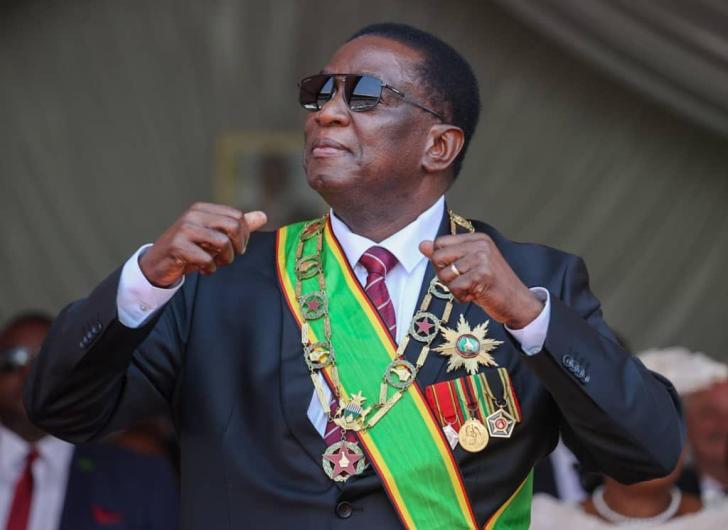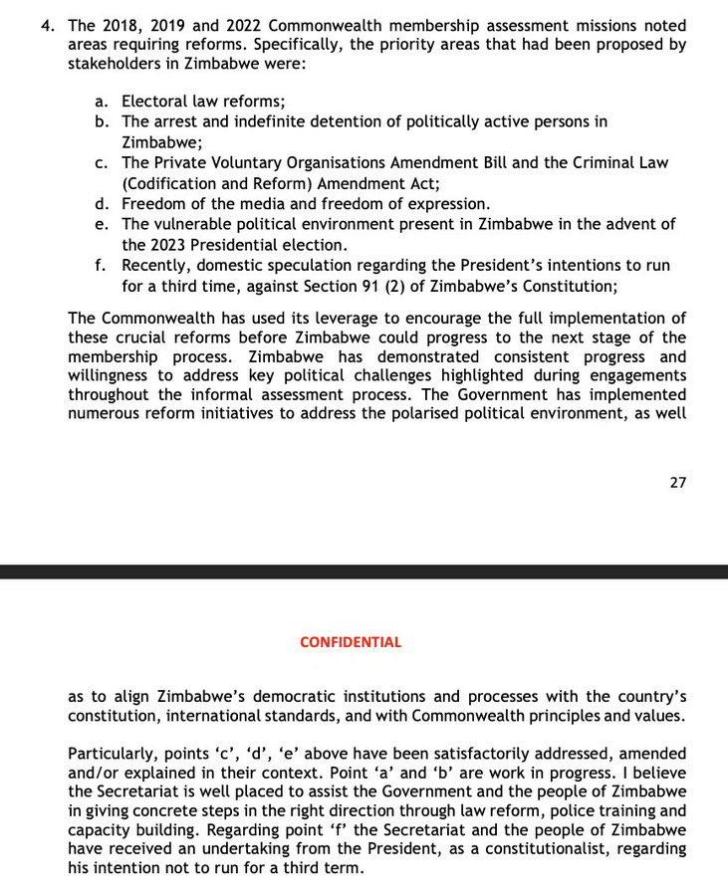News / National
Commonwealth calls Zimbabwe's Mnangagwa a 'constitutionalist'
3 hrs ago | Views

In a confidential statement released by the Commonwealth Secretariat, Secretary-General Patricia Scotland has hailed Zimbabwe's President Emmerson Mnangagwa as a "constitutionalist," praising his government for making "consistent progress" in addressing key political and electoral reforms. The statement, which outlines the results of the Commonwealth's recent assessment missions to Zimbabwe, acknowledges several areas where reforms have been made, particularly in the political and legal domains.
According to the document, which was marked confidential, the Commonwealth's 2018, 2019, and 2022 membership assessment missions identified various priority areas for reform in Zimbabwe. These areas included electoral law reforms, the arrest and indefinite detention of politically active individuals, media freedom, and the broader political environment in the lead-up to the 2023 presidential election.
The report highlights that Zimbabwe has made notable strides in addressing some of the key concerns raised by both domestic and international stakeholders, particularly in relation to the Private Voluntary Organisations Amendment Bill, the Criminal Law (Codification and Reform) Amendment Act, and media freedoms.
Regarding the controversial political arrests and indefinite detention of activists, the Commonwealth acknowledges that these issues are still a work in progress, but appreciates the government's ongoing efforts to tackle them. In addition, the report outlines the government's efforts to improve the political environment ahead of the 2023 elections.
On the subject of President Mnangagwa's future political ambitions, the statement refers to concerns about the possibility of the President running for a third term in office, despite Section 91(2) of Zimbabwe's Constitution, which limits presidential terms. The Commonwealth Secretariat has received an undertaking from Mnangagwa, who is described as a "constitutionalist," confirming his intention not to seek a third term, a pledge that has been deemed a significant commitment to upholding the country's constitutional framework.
The Commonwealth has stated its readiness to assist the Zimbabwean government in furthering these reforms, particularly through legal reforms, police training, and capacity building. The statement emphasizes that while there are still areas requiring attention, such as electoral law reforms and the arrest of political dissidents, Zimbabwe's government has demonstrated a willingness to engage in reform processes.
"The Government has implemented numerous reform initiatives to address the polarized political environment and align Zimbabwe's democratic institutions with international standards and Commonwealth values," the report reads. "Particularly, issues related to media freedom, political environment, and constitutional amendments have been satisfactorily addressed."
While the Commonwealth has expressed cautious optimism about the progress made, some critics in Zimbabwe remain skeptical about the government's commitment to meaningful reforms, especially concerning the broader political climate and the treatment of political opponents.
The statement concludes by reiterating that Zimbabwe's progress in meeting the Commonwealth's standards will determine its path toward full membership, with the Commonwealth continuing to offer support in strengthening the country's democratic processes.
The call by Secretary-General Scotland for President Mnangagwa's administration to remain committed to the rule of law and constitutionalism comes at a time when Zimbabwe is under intense scrutiny from both international bodies and domestic civil society groups, who continue to push for deeper reforms.

According to the document, which was marked confidential, the Commonwealth's 2018, 2019, and 2022 membership assessment missions identified various priority areas for reform in Zimbabwe. These areas included electoral law reforms, the arrest and indefinite detention of politically active individuals, media freedom, and the broader political environment in the lead-up to the 2023 presidential election.
The report highlights that Zimbabwe has made notable strides in addressing some of the key concerns raised by both domestic and international stakeholders, particularly in relation to the Private Voluntary Organisations Amendment Bill, the Criminal Law (Codification and Reform) Amendment Act, and media freedoms.
Regarding the controversial political arrests and indefinite detention of activists, the Commonwealth acknowledges that these issues are still a work in progress, but appreciates the government's ongoing efforts to tackle them. In addition, the report outlines the government's efforts to improve the political environment ahead of the 2023 elections.
On the subject of President Mnangagwa's future political ambitions, the statement refers to concerns about the possibility of the President running for a third term in office, despite Section 91(2) of Zimbabwe's Constitution, which limits presidential terms. The Commonwealth Secretariat has received an undertaking from Mnangagwa, who is described as a "constitutionalist," confirming his intention not to seek a third term, a pledge that has been deemed a significant commitment to upholding the country's constitutional framework.
The Commonwealth has stated its readiness to assist the Zimbabwean government in furthering these reforms, particularly through legal reforms, police training, and capacity building. The statement emphasizes that while there are still areas requiring attention, such as electoral law reforms and the arrest of political dissidents, Zimbabwe's government has demonstrated a willingness to engage in reform processes.
"The Government has implemented numerous reform initiatives to address the polarized political environment and align Zimbabwe's democratic institutions with international standards and Commonwealth values," the report reads. "Particularly, issues related to media freedom, political environment, and constitutional amendments have been satisfactorily addressed."
While the Commonwealth has expressed cautious optimism about the progress made, some critics in Zimbabwe remain skeptical about the government's commitment to meaningful reforms, especially concerning the broader political climate and the treatment of political opponents.
The statement concludes by reiterating that Zimbabwe's progress in meeting the Commonwealth's standards will determine its path toward full membership, with the Commonwealth continuing to offer support in strengthening the country's democratic processes.
The call by Secretary-General Scotland for President Mnangagwa's administration to remain committed to the rule of law and constitutionalism comes at a time when Zimbabwe is under intense scrutiny from both international bodies and domestic civil society groups, who continue to push for deeper reforms.

Source - byo24news












































